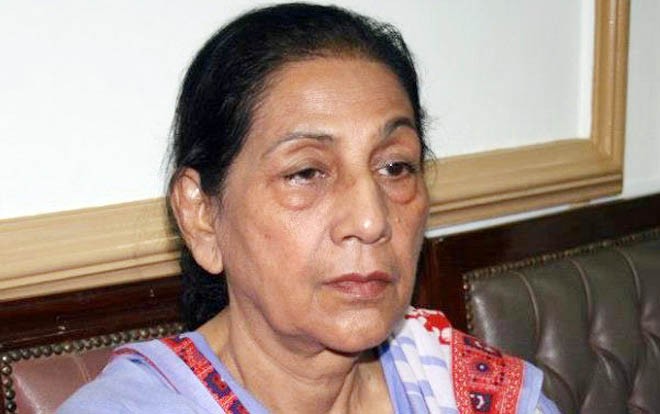
Nasreen Anjum Bhatti had no regrets while she was in our midst; having lost her we have many

Describing herself as "Balochi by birth, Sindhi by domicile and Punjabi by marriage" Nasreen Anjum Bhatti rightly claimed that she belonged to the whole of Pakistan. She remained faithful to the whole of Pakistan all her life, through brief periods of hope and longer periods of trial, but while some fellow poets honoured her as Amrita Pritam of Pakistan, her love for her land and its people remained largely unrequited.
I did not have opportunities of knowing her well enough to be able to write about her at length. But she was one of those persons who establish their credentials in briefest possible encounters. There was a time when she was the rage of the town and practically everybody in the community of writers and artists sought her company. She commanded attention not only by virtue of her striking figure and good looks, her more valuable assets were a highly cultivated mind and a burning passion for pro-people politics and social justice. She was a more gifted poet and political activist than her Master’s degree in Urdu indicated or her ability to write in several languages suggested.
Her choice of Zubair Rana as her spouse presented her with a series of challenges that tested her intellectual resources to the utmost but it also brought out the best of her capacity to care for fellow beings. Matching wits with Rana’s radical views on life and politics was not so much of a problem as was the crisis caused by his involvement in a near-fatal accident that severely damaged his brain. While looking after him she displayed the kind of strength and patience that are rare in our society if not wholly extinct. Eventually she was able to help him regain his health to a large extent and renew the intellectual exercises he liked to hold with friends and foes alike.
More than that, Nasreen, without a child of her own, brought up Rana’s two sons from an earlier marriage, and invested whatever she had in their education.
For the last many years she had been living in extreme adversity but without showing any signs of a compromise on her political ideals, love of Punjabi poetry or personal dignity. The once famous smile had disappeared from her deeply lined face but I could see her eyes sparkle with joy and satisfaction when she told me about the boys’ efforts to make their lives abroad.
Although she had a basketful of worries of her own I found her ready to fight for any lost cause that came her way. She was all for promoting a new form of purposeful cinema and for giving the poorer sections of society a taste of song and music and she even did not mind offering help to a struggling publisher of a radical news sheet.
Everyone who knew her admired her for the strength of her conviction. She knew that she belonged to a group of poets who had rebelled against the traditional authorities on the art of poetry and were never forgiven for that. She herself did not complain against such authorities when they said that the poetry of Nasreen and her friends was obscure or vague. When reminded of the ‘old school’s’ refusal to accept her status as a modern poet of note, she laughed and said, "Who am I? They do not acknowledge Najm Hosain Syed even."
The authorities tried to frighten her when she wrote an elegy on the hanging of Bhutto but she held her ground.
She rarely spoke about her private life. When every evening she disappeared in a small lane running by the side of a mansion built by a famous Speaker of the Punjab Assembly, and known as the residence of a politician who boasted of owning a large library, her fatigued figure offered a stinging comment on the poverty of Pakistan’s world of letters.
Nasreen firmly adhered to her faith but she did not wear it on her cuff. Unless told by others no one could guess where and how she offered her prayers or whether she prayed at all. Nor was she interested in finding out what belief of the person sitting across the table was. Her faith in a single human family was unshakable.
Nasreen Anjum Bhatti gave her people a great deal to enjoy or reflect upon but she remained a disadvantaged person -- both as a Christian and as a woman. In her tribulations one can see the injustices our class conscious, patriarchal and communal-minded society does to the precious daughters and sons of the soil. And suffers no pangs of shame.
Nasreen Anjum Bhatti had no regrets while she was in our midst; having lost her we have many.